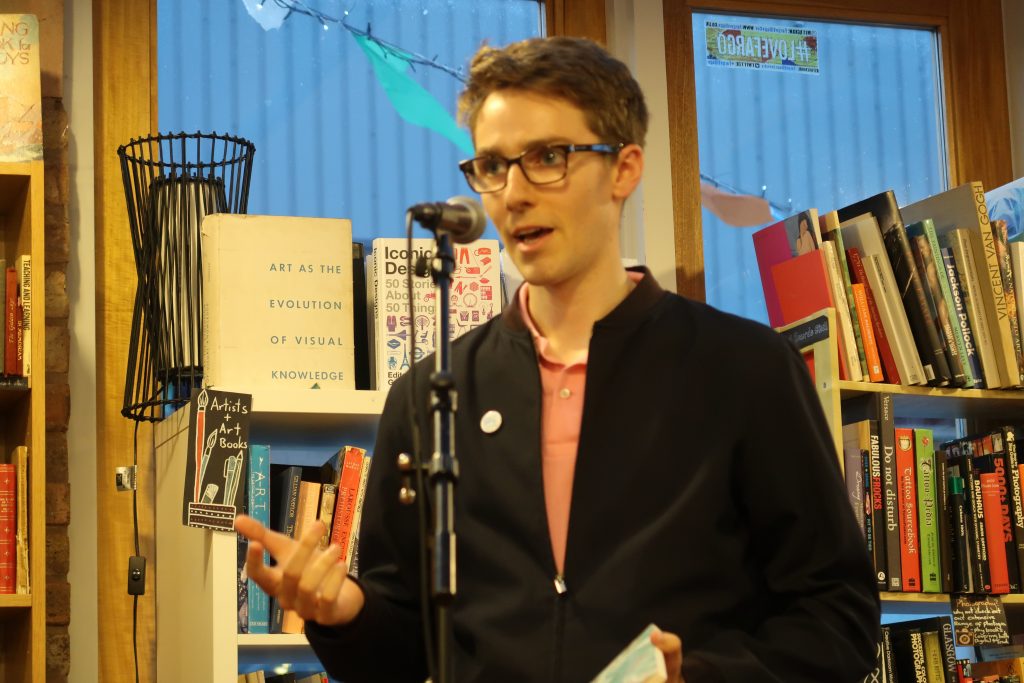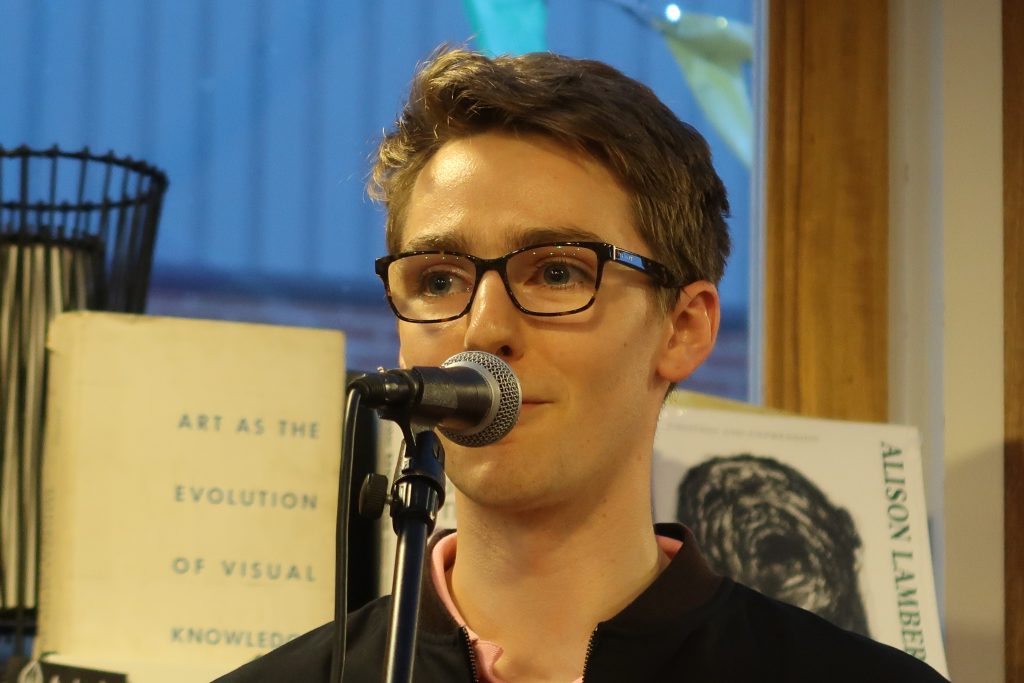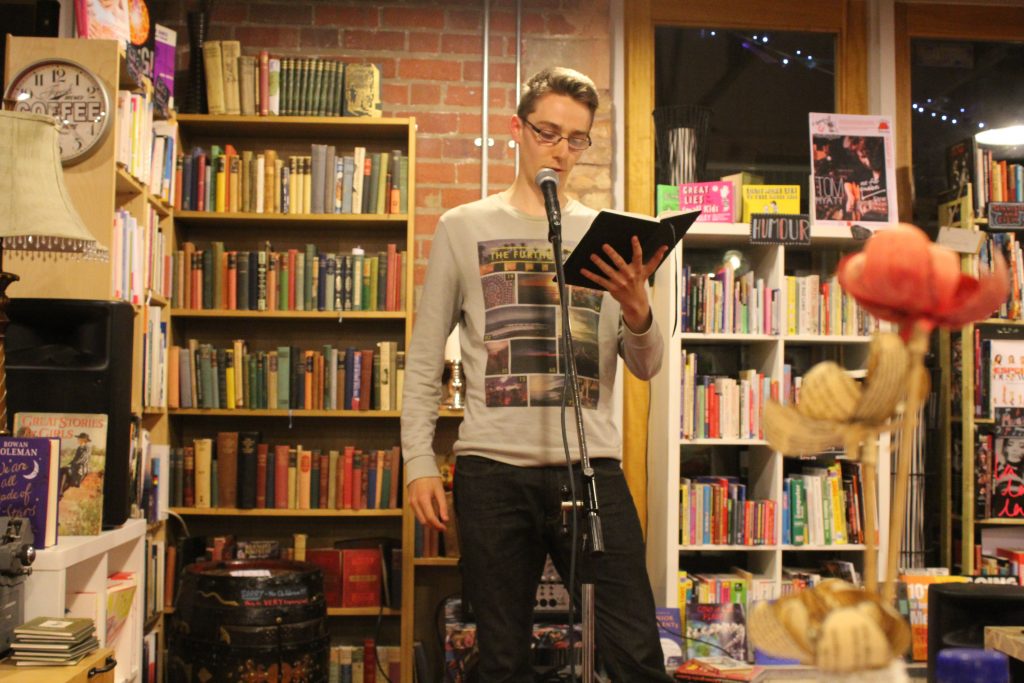FIRE & DUST INTRODUCES: MIKE PHILIPS
Light breaks through the shadows,
Silence is filled with words
The hours repeat themselves
Until they are no longer heard
It goes quiet in the darkness
While the future waits for the past
To sweep away the old empires
Though these new ones will never last
Our ancestors held ceremonies to worship the sun
Lacking any scientific basis for these games,
But it would still be easy enough
To fill the ancient stories with names
Familiar characters
Take part in the same narratives
Caught unaware
In the unconquerable forever
Icarus is flying towards the sun,
With a new identity,
On a different day,
The parables come flickering into life
(‘Though the Ages’, Mike Philips)

On 2nd August 2018, Mike Philips headlined our Fire & Dust poetry event (alongside writer Adam Steiner). Mike joined HCE magazine as our new Poetry Sub-Editor, just before the summer, but he was booked a good while before this and has been a regular performer at Fire & Dust for a good while now. His work, with its blend of humour and thought-provoking lines, has been a big hit with local audiences.
We caught up with Mike after the gig, to ask him a few questions…
How long have you been writing poetry?
I can’t remember exactly, but I started writing poetry when I was about 20 years old, so that makes it around five years now. It was never something that I imagined myself doing, but it provided a great form of expression during some difficult times.
You’re a former student of literature, but also work in the field of accountancy, meaning you join the ranks of poets with an interest in mathematics (and vice versa), such as Harry Baker, Cai Tianxin, JoAnne Growney, François Le Lionnais, Jacques Roubard and Stephen Hawking. Is there any connection between a love of numbers and love of poetry; in your opinion, do the two things intersect well?
I think accountancy is often perceived as very rigid while literature is seen as the more creative pursuit. However, these differences are not as pronounced as they might seem at first glance. The use of structure in poetry helps to enhance images and emotions, while accountants are often required think creatively to find answers to complex problems.
How often do you write a poem, and do you have a writing routine?
I tend to fluctuate between high and low levels of activity. This seems natural because I think poetry is heavily influenced by the subconscious processing of day to day experiences.
During periods when I write frequently I seem to be urged on by impulse, but I would like to develop a more regular routine to practice new techniques. However, sometimes I get busy with other things and may also reach a point where I have simply run out of things to say.
Are there any recurring themes in your work?
I would say that my writing tends to focus on coming of age, which creates an antagonism between difficult existential questions and the attempt to find reassuring answers.
Are you exclusively a poet, or do you also write in other forms?
I am exclusively a poet, but I love reading novels and plays too.
Do you enjoy performing your poetry? Any tips for nervous open mic newbies out there?
The performance element always generates nerves which fluctuate with each performance, so they can be enjoyable, but not always. Even so, I like to share and listen to poetry because it reveals the multi-dimensional worlds hidden inside each performer.
To any new performers, if you practice and try your best, the audience ought to appreciate your efforts. If not, they have probably come to the wrong place!

What can people expect to experience at a Mike Phillips poetry gig?
I look to structure my performances around the difficulties presented by challenging themes such as love, time, destiny, etc. However, the audience can also expect a bit of a laugh, as I think it is healthy to include a few poems that knock these themes off their pedestal as an occasional palate cleanser.
Who are your favourite writers, and have these had any influence on your own work?
In terms of poets, John Cooper Clarke had a formative influence in helping me to enjoy poetry, and my favourite poets are currently Pablo Neruda, for his emotive imagery, and A. E. Housman, for his austere yet powerful use of structure.
I love the novels of Gabriel Garcia Marquez and Virginia Woolf, and if you are asking about plays it would be Anton Chekhov, closely followed by Samuel Beckett and Federico Garcia Lorca.
Aside from literature, I am influenced by musicians that sit on the boundary of poetry, from Joni Mitchell to The Streets.
You recently joined the HCE team as Poetry Sub-editor. Has the process of reading and critiquing submissions had any positive impact on your own writing practice?
It has increased my awareness of the different styles, structures and techniques that are out there. It has highlighted the importance of making an impact by using language effectively and precisely. It has also shown the value of perseverance, as many of the poems that don’t make it have real potential, but just need a bit more editing.

Any other performances or projects coming up?
I am due to perform in Kenilworth next February at an event called Pure, Good & Right (PGR).
In the meantime, I will keep up with my writing and submissions.
Editor’s note: You can follow PGR on Twitter (@PGRpoetry) for updates about their events and headliners.
